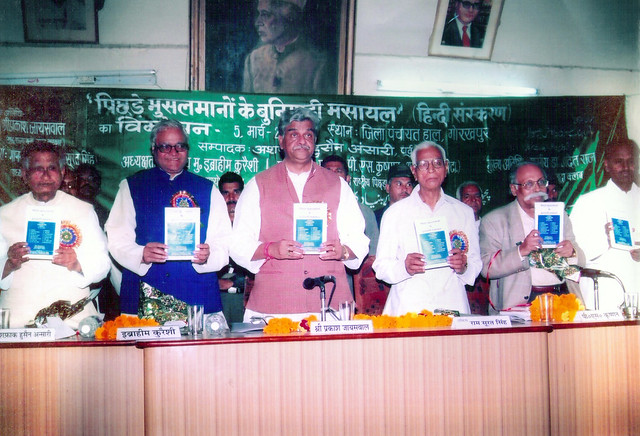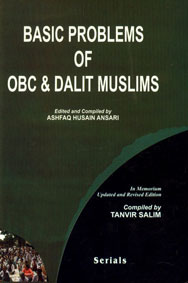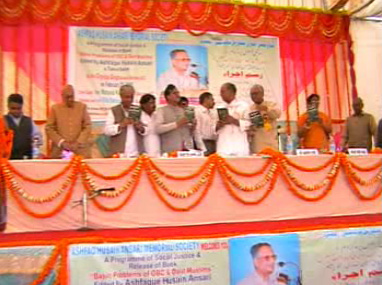Son’s tribute to the Pasmanda icon from Gorakhpur.
By Tanvir Salim,
Soon it will be five years since my father passed away. My father passed away during the last days of December in 2008. The loss of a parent is very traumatic for a child, regardless of age. For me it was a very nerve wrecking experience; I suddenly found myself staring in cold vacuum. Like any other child, I was not ready. I guess nobody ever gets ready for such a calamity. I cannot fulfill my life-long desire of going back and reconnecting with him.
My father devoted his life for the advocacy of the weakest in the society. He will be missed by the ones whose lives he touched. He championed the cause of those who were marginalized because of the “others” who at times claimed to be their self-appointed patrons, but as a matter of fact they simply took them for a ride. These patrons may not have been instrumental in creating a schism among the Muslims, but they nurtured the divide for their own benefit. Although this division among the Muslims contradicts the tenets of the religion we follow, it has been used as a tool for ages to keep the Muslim leadership in the hands of a selected few. My father chastised these self-appointed “leaders” and urged them to show wisdom and courage and to speak the truth. His was a strong voice in favor of the struggle for social justice, and he was determined to let others know of the need to restore the dignity of others.

Taken at a Book Release Function in Gorakhpur in 2005.
He was of the opinion that the core issues of “Roti, Kapra aur Makan”, for Muslims were put on the sidelines and how the other issues, i.e., destruction of Babri Masjid, Urdu and the minority character of AMU hijacked the core issues and captivated the heart and mind of the Muslim leadership. He feared that Muslim leadership was intentionally drifting away from the core issues because these issues were challenging and there were no easy answers. To him, some of the so called Muslim well-wishers were only interested in the politics of mobilization for the sake of sharing the spoils of power. I heard him saying that when all the issues fizzled, they invented a new cause of providing reservation to all Muslims in the lines of the reservation that has been provided to schedule castes and schedule tribes. My father was quick to understand the sinister design of these leaders and according to him; this one demand had the potency to convolute the concept of reservation which was being granted to the backward sections of the Muslims. He knew that this new “ploy” will play well and may bring dividends to the ones who are the experts in the politics of mobilization, but for the poor Muslim masses, it will be nothing more than another broken promise by the leaders. Being very knowledgeable on the fundamentals of these concepts, he very well knew that the much discussed concept of reservation for “all” Muslims is not possible, because it is not allowed as per the Indian constitution.
He was often critical of the leadership that existed. In that leadership he saw people whose vision was limited and who could not see the miseries and the pains which ordinary Muslims were facing in their daily lives. He saw a reason behind all this. According to him, the reigns of the Muslim leadership was in the hands of the “elites”, who for the most part were enjoying the comforts of the ivory towers in which they had spent most of their lives. They were not in a position to make their voices heard because they were mostly given secondary roles to play. He was right, after some basic research, I started to wonder when the last time was that we had a Muslim leader in charge of a major portfolio in the government.

“Basic Problems of OBC and Dalit Muslims”-Released after his death in 2010.
At one time, while reading from one of the essays in his book, he stressed the fact that in India, the Dalits got their Ambedkar, some of the Muslims got their Sir Syed, but for the Backward Muslims, there has been nobody. They were left to the mercy of those on the surface who were eager to provide lip service for their votes, but in return remained insulated from their hard core issues. It was painful for me to observe how the politics of the time was fast becoming, as somebody said, “the last refuge for the scoundrels” and unfortunately there was no place for a “gentleman”. The dominance of money and muscle power has become the new yard stick and the person with the meager resources was slowly getting isolated and was eventually left out from the political arena.
I am fully aware of the promises that he made to his fellow constituents and the dream he had for all of us. I know that he worked hard to bring them to reality, but deep in his heart he had a burning desire to do more. Soon came the time when the fragilities of the human body were unable to keep up with the realities of life. He left this mortal world with an unfinished agenda, which we have to carry from that point onward.
The late Ashfaq Husain Ansari was born on December 25th 1934 in Gorakhpur. His grandfather, the late Sheikh Murtaza Husain, was a powerful business man and an influential political figure, who was also a powerful Zamindar of Gorakhpur. His father, the late Istafa Husain, was a leading politician of his times.

Taken at the Book Release function in 2010.
The late Ashfaq Husain was active in politics from his student life. He completed his B.A. form Gorakhpur and then his studies were discontinued due to his involvement in the freedom struggle. He was actively involved in the family business of forest contracting and the cold storage. Apart from this, he was involved in the local politics and was member of the Executive Committee, Gorakhpur Zila Parishad from 1974-78. He was also a member of the State Board of Animal Husbandry in the Uttar Pradesh government. He was also in the Presidium of the U.P. Students Federation Conference held at Varanasi in 1951 and was Secretary of the Indo-Soviet Friendship Association for the last twenty years along with the Member of the Executive Committee of the State Indo-Soviet Cultural Society.
He was Member of Parliament in the seventh Lok Sabha from the Maharajganj constituency near Gorakhpur in Uttar Pradesh. During his tenure he was involved with the world peace movement and represented India conferences held in Prague and Moscow. In Parliament he raised many issues that were mainly related to trade and commerce. He was instrumental in getting various projects for the benefit of the constituents of Gorakhpur region. He worked tirelessly for the cause of the weaker sections of the society. When the first Minority Commission was formed in Uttar Pradesh, he was one of the charter members of that commission. He advocated for the cause of social justice amongst Muslims and for this purpose wrote more than hundreds of articles in various publications.
All of his three sons are engineers and are settled in the United States, whereas the daughter is in India.
(The author, a Nuclear Engineer educated/trained/settled in the United States is the eldest son of late Ashfaq Husain Ansari. Presently he is in India. For more information, please visit www.tanvirsalim.com)

